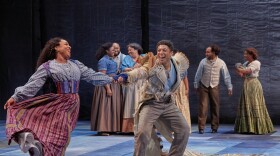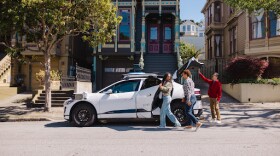
Chad Davis
General Assignment ReporterChad Davis is a 2016 graduate of Truman State University where he studied Public Communication and English. At Truman State, Chad served as the executive producer of the on-campus news station, TMN Television. In 2017, Chad joins the St. Louis Public Radio team as a general assignment reporter. Chad is a native of St. Louis and is a huge hip- hop, r&b, and pop music fan. He also enjoys graphic design, pop culture, film, and comedy.
-
The decision by St. Louis Circuit Judge Steven R. Ohmer brings a dramatic end to Montgomery’s turbulent yearlong tenure — one marked by lawsuits, whistleblower complaints, a damning city audit and a court battle over whether he should remain in office.
-
Opera Theatre of St. Louis will renovate the former Caleres headquarters in Clayton before moving in.
-
Foxing is a pillar of the Midwest emo revival movement. After 14 years, the St. Louis band announced a hiatus from performing and recording music. Guitarist Eric Hudson and the group’s fans share their memories over the past decade.
-
The owner of a popular south St. Louis gay bar has filed a lawsuit against the officers and the city alleging assault and wrongful arrest.
-
St. Louis sheriff's lawyers said it cost $6,852.54 for U.S. marshals to transport Alfred Montgomery to and from jail during the five-day trial.
-
Waymo will launch its automated vehicles in St. Louis this week. The San Francisco-based company said the vehicles will have drivers at first.
-
The St. Louis County animal shelter will host its first waived adoption fee event in an effort to reduce the number of pets at the shelter, which has been criticized for its overcrowding.
-
The trial in the Missouri attorney general's effort to remove St. Louis' elected sheriff came to a close on Tuesday after more than 30 witnesses took the stand over a week. Here's what happened.
-
Former Master Sgt. Bryan Robins said he heard acting Jail Commissioner Tammy Ross say something like "go ahead and ‘cuff me'" during a confrontation with Sheriff Alfred Montgomery.
-
Federal case creates "disturbing" challenges while weighing St. Louis sheriff’s removal, judge says during the third day of trial.
-
The second full day of the trial over the Missouri attorney general’s attempt to permanently remove St. Louis Sheriff Alfred Montgomery got off to a rocky start filled with yelling, accusations of retaliation and testimony from deputies.
-
The first full day of St. Louis Sheriff Alfred Montgomery’s removal trial brought testimony from deputy jail boss Tammy Ross, former Capt. Anthony Anderson and others.












